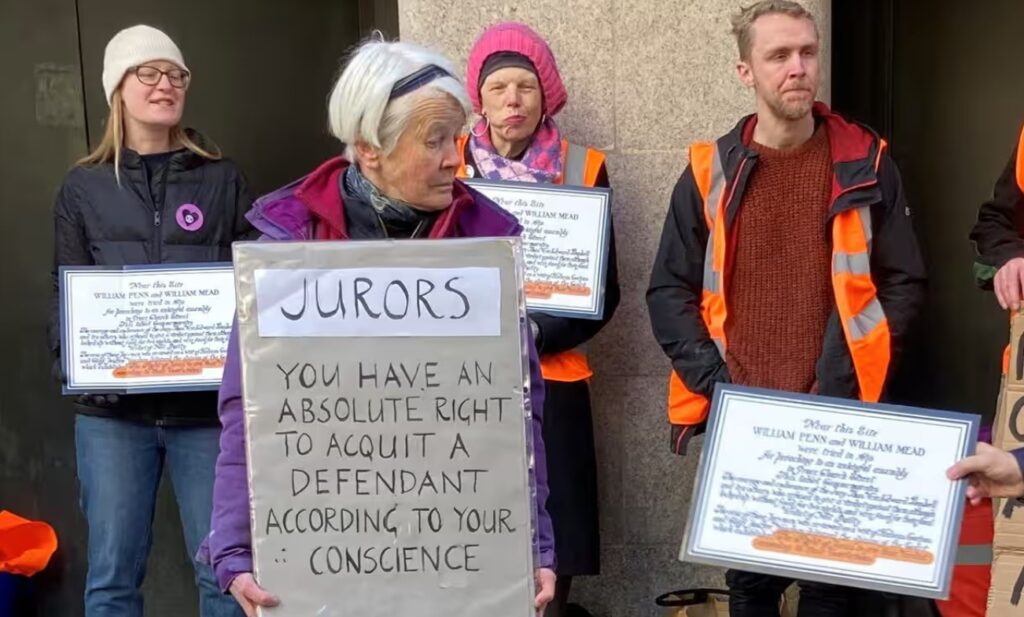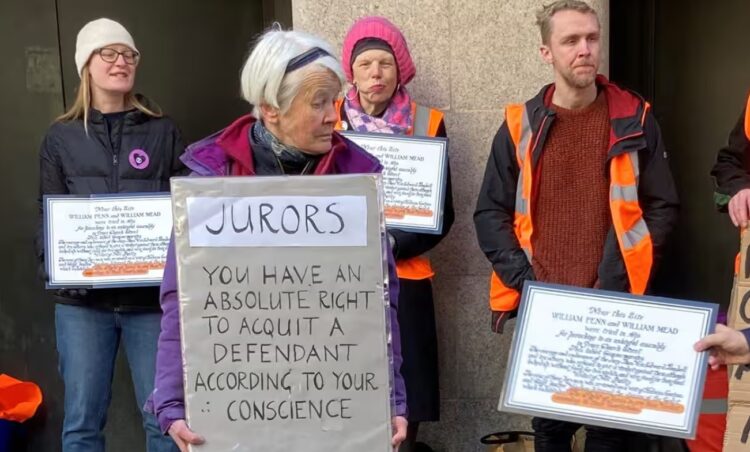A high court judge has thrown out an attempt by the government’s most senior law officer to prosecute a woman for holding a placard on jury rights outside a climate trial. (Guardian, Law Society Gazette, Reuters).
Handing down his judgment in the Royal Courts of Justice last week, Mr Justice Saini said there was no basis for a prosecution of Trudi Warner, 69, for criminal contempt for holding a placard outside the trial of climate activists that informed jurors of their right to acquit a defendant based on their conscience.
Warner, a retired social worker, was being pursued for contempt of court after a lone protest last year outside inner London crown court. In an attempt to highlight the right of jurors to acquit defendants on their conscience she held up a placard for approximately 30 minutes as member of the public, lawyers and potential jurors filed into court.

The sign read: “Jurors, you have an absolute right to acquit a defendant according to your conscience.” This was in reference to Bushell’s Case, a landmark 1670 case, in which Chief Justice John Vaughan established that jurors could no longer be judicially fined for reaching a conclusion with which the trial judge disagreed, even if repeatedly instructed to do so by the judge.
Following Warner’s protest at the start of the trial of Insulate Britain protesters for a roadblock, the Attorney General, Victoria Prentis, decided to pursue Warner for contempt of court. Last week, the Solicitor General, Robert Courts, attended the high court to seek permission to charge Warner.
Aidan Eardley KC, for the government, told the court a prosecution was needed “to maintain public confidence” in the independence of the jury system and that if Warner went unpunished, similar acts were “likely to propagate”. He also claimed Warner had confronted jurors outside court and her actions were an interference with the administration of justice.
In Monday’s ruling, however, Saini dismissed the claim in its entirety, and in a sharp rebuke to the government said that a criminal prosecution was a “disproportionate approach” to this issue, which unlawfully interfered with Warner’s right to freedom of expression.
The Court of Appeal has confirmed that eco-activists accused of criminal damage cannot use the "consent" defence against prosecution by arguing they honestly believe a property owner would consent to their actions if fully aware of the "circumstances".https://t.co/sZ36TAMxIQ
— The Free Speech Union (@SpeechUnion) March 25, 2024
Addressing the packed court, Saini said the case brought before him demonstrated a “mischaracterisation of what [Warner] did” as well as a “failure to recognise the placard said what is essentially regularly read by Old Bailey jurors”.
Rejecting the argument that Warner had “confronted jurors and followed jurors to intercept them”, he pointing out that “CCTV does not disclose reasonable basis that the court can be sure of those accusations”.
Of the placard itself, the judge said it did not present “an ‘instruction or encouragement’ or constitute a ‘plain invitation’ to passers-by to discharge their duties in a particular way”.
Saini also said that Warner had made no attempt compel those going into the court. “What is striking to me,” he remarked, “is how little Ms Warner tries to engage with people, to get their attention, or to persuade them of anything. She was … in essence, a human billboard.”
In his written judgment, Saini concluded that the Solicitor General “does not have a reasonable basis in fact and law for pursuing these proceedings on the basis of the common law form of contempt”, adding that Warner’s conduct did not amount to an actionable contempt.






